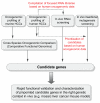Cancer gene discovery in hepatocellular carcinoma
- PMID: 20385424
- PMCID: PMC2905725
- DOI: 10.1016/j.jhep.2009.12.034
Cancer gene discovery in hepatocellular carcinoma
Abstract
Hepatocellular carcinoma (HCC) is a deadly cancer, whose incidence is increasing worldwide. Albeit the main risk factors for HCC development have been clearly identified, such as hepatitis B and C virus infection and alcohol abuse, there is still preliminary understanding of the key drivers of this malignancy. Recent data suggest that genomic analysis of cirrhotic tissue - the pre-neoplastic carcinogenic field - may provide a read-out to identify at risk populations for cancer development. Given this contextual complexity, it is of utmost importance to characterize the molecular pathogenesis of this disease, and pinpoint the dominant pathways/drivers by integrative oncogenomic approaches and/or sophisticated experimental models. Identification of the dominant proliferative signals and key aberrations will allow for a more personalized therapy. Pathway-based approaches and functional experimental studies have aided in identifying the activation of different signaling cascades in HCC (e.g. epidermal growth factor, insulin-like growth factor, RAS, MTOR, WNT-betacatenin, etc.). However, the introduction of new high-throughput genomic technologies (e.g. microarrays, deep sequencing, etc.), and increased sophistication of computational biology (e.g. bioinformatics, biomodeling, etc.), opens the field to new strategies in oncogene and tumor suppressor discovery. These oncogenomic approaches are framed within emerging new disciplines such as systems biology, which integrates multiple inputs to explain cancer onset and progression. In addition, the consolidation of sophisticated animal models, such as mosaic cancer mouse models or the use of transposons for mutagenesis screens, have been instrumental for the identification of novel tumor drivers. We herein review some classical as well as some recent fast track approaches for oncogene discovery in HCC, and provide a comprehensive landscape of the currently known spectrum of molecular aberrations involved in hepatocarcinogenesis.
Copyright 2010 European Association for the Study of the Liver. Published by Elsevier B.V. All rights reserved.
Figures


Similar articles
-
Molecular pathogenesis of hepatocellular carcinoma.Alcohol Clin Exp Res. 2011 May;35(5):821-5. doi: 10.1111/j.1530-0277.2010.01406.x. Epub 2011 Feb 8. Alcohol Clin Exp Res. 2011. PMID: 21303380 Review.
-
Early molecular and genetic determinants of primary liver malignancy.Surg Clin North Am. 2004 Apr;84(2):339-54. doi: 10.1016/S0039-6109(03)00226-3. Surg Clin North Am. 2004. PMID: 15062649 Review.
-
IGF2 Is Up-regulated by Epigenetic Mechanisms in Hepatocellular Carcinomas and Is an Actionable Oncogene Product in Experimental Models.Gastroenterology. 2016 Dec;151(6):1192-1205. doi: 10.1053/j.gastro.2016.09.001. Epub 2016 Sep 7. Gastroenterology. 2016. PMID: 27614046
-
Pivotal role of mTOR signaling in hepatocellular carcinoma.Gastroenterology. 2008 Dec;135(6):1972-83, 1983.e1-11. doi: 10.1053/j.gastro.2008.08.008. Epub 2008 Aug 20. Gastroenterology. 2008. PMID: 18929564 Free PMC article.
-
Pathways and gene expression profiles in hepatocellular carcinoma.Minerva Gastroenterol Dietol. 2012 Mar;58(1):35-48. Minerva Gastroenterol Dietol. 2012. PMID: 22419003 Review.
Cited by
-
Investigation of oncogenic cooperation in simple liver-specific transgenic mouse models using noninvasive in vivo imaging.PLoS One. 2013;8(3):e59869. doi: 10.1371/journal.pone.0059869. Epub 2013 Mar 28. PLoS One. 2013. PMID: 23555816 Free PMC article.
-
NEpiC: a network-assisted algorithm for epigenetic studies using mean and variance combined signals.Nucleic Acids Res. 2016 Sep 19;44(16):e134. doi: 10.1093/nar/gkw546. Epub 2016 Jun 14. Nucleic Acids Res. 2016. PMID: 27302130 Free PMC article.
-
The role of bone marrow-derived cells in the origin of liver cancer revealed by single-cell sequencing.Cancer Biol Med. 2020 Feb 15;17(1):142-153. doi: 10.20892/j.issn.2095-3941.2019.0369. Cancer Biol Med. 2020. PMID: 32296582 Free PMC article.
-
Overexpression of GRIM-19, a mitochondrial respiratory chain complex I protein, suppresses hepatocellular carcinoma growth.Int J Clin Exp Pathol. 2014 Oct 15;7(11):7497-507. eCollection 2014. Int J Clin Exp Pathol. 2014. PMID: 25550785 Free PMC article.
-
Dysregulation of Wnt/β-catenin signaling in gastrointestinal cancers.Gastroenterology. 2012 Feb;142(2):219-32. doi: 10.1053/j.gastro.2011.12.001. Epub 2011 Dec 8. Gastroenterology. 2012. PMID: 22155636 Free PMC article. Review.
References
-
- Llovet J, Burroughs A, Bruix J. Hepatocellular carcinoma. The Lancet. 2003;362(9399):1907–17. - PubMed
-
- Villanueva A, Newell P, Chiang DY, Friedman SL, Llovet JM. Genomics and signaling pathways in hepatocellular carcinoma. Semin Liver Dis. 2007;27(1):55–76. - PubMed
-
- Llovet J, Di Bisceglie AM, Bruix J, Kramer BS, Lencioni R, Zhu AX, et al. Design and endpoints of clinical trials in hepatocellular carcinoma. J Natl Cancer Inst. 2008;100(10):698–711. - PubMed
-
- Llovet J, Ricci S, Mazzaferro V, Hilgard P, Gane E, Blanc JF, et al. Sorafenib in advanced hepatocellular carcinoma. N Engl J Med. 2008;359(4):378–90. - PubMed
Publication types
MeSH terms
Grants and funding
LinkOut - more resources
Full Text Sources
Other Literature Sources
Medical
Miscellaneous

